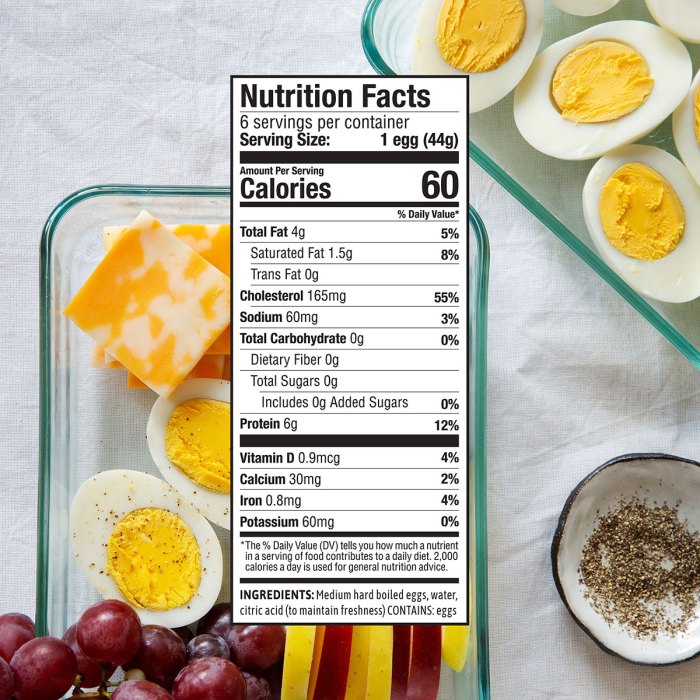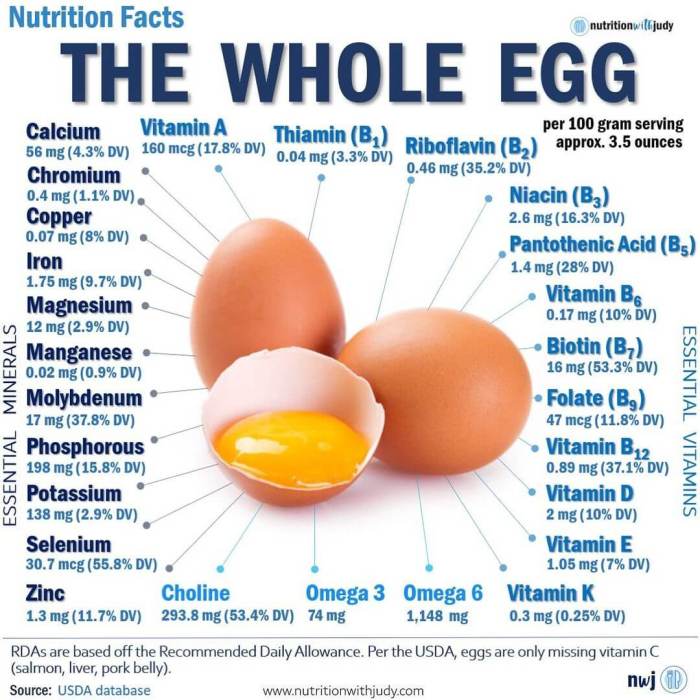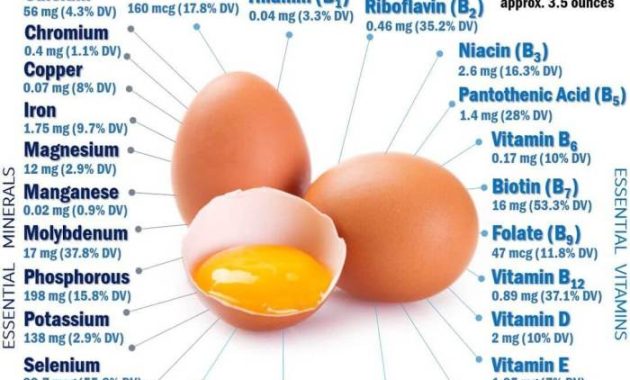Preparation and Storage: Hard Boiled Eggs Nutrition Facts

Hard boiled eggs nutrition facts – Perfect hard-boiled eggs are a culinary delight, offering a versatile and nutritious addition to meals and snacks. Proper preparation and storage are crucial to ensure both optimal texture and safety, preventing bacterial growth and maintaining freshness. This section details the best practices for achieving consistently excellent results.
Hard-boiled eggs are a protein powerhouse, perfect for a quick and healthy breakfast. But if you’re craving something a little less… eggy, you might check out the sonic menu nutrition facts for some fast-food options. However, remember that the nutritional value of hard-boiled eggs is unmatched in its simplicity and density – a true breakfast of champions.
Preparing Perfectly Cooked Hard-Boiled Eggs
Achieving the perfect hard-boiled egg requires attention to detail and a few key techniques. Overcooking can result in dry, rubbery whites and a greenish tinge to the yolk, while undercooking leaves the egg runny. The following steps Artikel different methods for achieving consistently perfect results.
- Method 1: Stovetop Boiling: Place eggs gently in a single layer in a saucepan. Cover with cold water by about an inch. Bring to a rolling boil over high heat. Once boiling, immediately remove from heat, cover the pan, and let the eggs sit in the hot water for 10-12 minutes for perfectly cooked hard-boiled eggs. Larger eggs may require a slightly longer cooking time.
Immediately transfer the eggs to an ice bath to halt the cooking process.
- Method 2: Instant Pot Pressure Cooking: Add 1 cup of water to the Instant Pot. Place eggs in the trivet. Close the lid and set the valve to sealing. Cook on high pressure for 5 minutes. Allow for a natural pressure release for 10 minutes, then carefully quick release any remaining pressure.
Transfer eggs to an ice bath.
- Troubleshooting Green Yolks: A greenish ring around the yolk is caused by a reaction between iron in the yolk and hydrogen sulfide in the white when overcooked. To prevent this, ensure the eggs are not overcooked and immediately transfer them to an ice bath after cooking.
- Troubleshooting Cracking: To prevent cracking, add a teaspoon of salt or vinegar to the boiling water. This helps strengthen the egg’s shell. Also, gently lower the eggs into the boiling water to avoid impacting the shell against the pan.
Storing Hard-Boiled Eggs Safely
Proper storage is paramount to maintaining the quality and safety of hard-boiled eggs. Improper storage can lead to rapid spoilage and bacterial contamination.
The following infographic visually depicts optimal storage practices:
Infographic Description: The infographic is divided into three sections. The first section, titled “Optimal Storage,” shows a refrigerator with a container of hard-boiled eggs nestled in a single layer, covered with a lid. A large arrow points to the refrigerator, with the text “Refrigerate Immediately.” The second section, titled “Storage Duration,” displays a timeline showing that hard-boiled eggs should be consumed within 1 week of boiling.
The final section, “Spoilage Indicators,” shows an image of a hard-boiled egg with visible mold growth, accompanied by text stating “Discard if mold, foul odor, or slimy texture is present.” The background color is a calming pastel blue, and the text is in a clear, easy-to-read font.
Peeling Hard-Boiled Eggs Efficiently
Peeling hard-boiled eggs without cracking the shell can be challenging. Several techniques can significantly improve the peeling process.
- Method 1: Ice Bath Shock: Immediately after cooking, transfer eggs to an ice bath for at least 10 minutes. This helps separate the shell from the egg white.
- Method 2: Gentle Tapping: Gently tap the egg all over on a hard surface to create small cracks in the shell. This facilitates peeling.
- Method 3: Rolling Technique: Roll the egg firmly on a countertop to create more cracks before peeling. This helps to loosen the shell.
- Method 4: Spoon Peeling: Use a spoon to gently lift and separate the shell from the egg white, starting at the larger end of the egg.
Hard-Boiled Eggs in Recipes and Meal Planning

Hard-boiled eggs are a remarkably versatile and nutritious addition to a wide array of meals and snacks. Their creamy texture and mild flavor profile allow them to seamlessly integrate into both sweet and savory dishes, offering a convenient and protein-packed boost to any culinary creation. Their portability also makes them an ideal component for meal prepping and on-the-go sustenance.Hard-boiled eggs effortlessly elevate the simplicity of everyday meals, adding a layer of richness and substance.
Their use extends far beyond a simple breakfast staple; they are a culinary chameleon, adapting to various tastes and dietary needs.
Incorporating Hard-Boiled Eggs into Meals and Snacks
The smooth, firm texture of a perfectly cooked hard-boiled egg lends itself beautifully to numerous culinary applications. Imagine the satisfying crunch of a hard-boiled egg nestled amongst crisp lettuce, juicy tomatoes, and a vibrant vinaigrette in a classic egg salad. Or picture the elegant simplicity of a hard-boiled egg, halved and sprinkled with paprika, atop a bed of creamy avocado toast.
The possibilities are as boundless as your imagination. A hard-boiled egg adds a delightful protein punch to a quick lunch salad, a satisfying addition to a hearty breakfast bowl with quinoa and berries, or even a creative twist on a classic potato salad. The subtle flavor profile complements both light and robust dressings, making it a versatile addition to almost any dish.
A Weekly Meal Plan Featuring Hard-Boiled Eggs
A well-structured weekly meal plan can significantly simplify meal preparation while ensuring a balanced intake of essential nutrients. Here’s an example of how hard-boiled eggs can be integrated throughout the week, showcasing their adaptability as a protein source:Monday: Breakfast – Hard-boiled egg with whole-wheat toast and a side of sliced tomatoes. Lunch – Salad with mixed greens, hard-boiled egg, chickpeas, and a lemon vinaigrette.
Dinner – Chicken stir-fry with a side of steamed broccoli and a hard-boiled egg for extra protein.Tuesday: Breakfast – Breakfast bowl with Greek yogurt, berries, and a chopped hard-boiled egg. Lunch – Hard-boiled egg and avocado sandwich on whole-grain bread. Dinner – Quinoa salad with roasted vegetables and a hard-boiled egg.Wednesday: Breakfast – Scrambled eggs with spinach and a side of hard-boiled egg.
Lunch – Leftover quinoa salad. Dinner – Tuna salad sandwich with hard-boiled egg.Thursday: Breakfast – Hard-boiled egg with whole-grain crackers and cottage cheese. Lunch – Leftover tuna salad. Dinner – Omelette with chopped hard-boiled egg and cheese.Friday: Breakfast – Hard-boiled egg with a side of fruit salad. Lunch – Salad with hard-boiled egg, grilled chicken, and a light dressing.
Dinner – Pasta salad with vegetables and a hard-boiled egg.Saturday: Breakfast – Hard-boiled egg with whole-wheat toast and avocado. Lunch – Leftover pasta salad. Dinner – Pizza with a side salad and a hard-boiled egg.Sunday: Breakfast – French toast with a side of hard-boiled egg. Lunch – Leftover pizza. Dinner – Roasted chicken with roasted vegetables and a hard-boiled egg.
Hard-Boiled Eggs in Sweet and Savory Dishes, Hard boiled eggs nutrition facts
The versatility of hard-boiled eggs extends beyond the realm of savory dishes. Their mild flavor profile allows them to be seamlessly integrated into sweet creations, adding a unique textural contrast. For example, finely chopped hard-boiled eggs can be incorporated into muffins or quick breads, providing a subtle savory note that complements the sweetness of the batter. Imagine the delightful combination of a creamy hard-boiled egg in a sweet potato and coconut milk curry, adding a rich protein boost to this hearty and flavorful dish.
Alternatively, consider the textural contrast of a finely diced hard-boiled egg in a creamy rice pudding, providing a surprising and delightful element. The possibilities are truly endless.
Popular Questions
Are hard-boiled eggs good for weight loss?
Hard-boiled eggs are a great addition to a weight-loss diet due to their high protein content, which promotes satiety and helps regulate appetite. The protein also supports muscle mass, aiding in metabolism.
How long can I store hard-boiled eggs in the refrigerator?
Ideally, hard-boiled eggs should be refrigerated within two hours of cooking and consumed within one week for optimal freshness and safety. Discard any eggs showing signs of spoilage, such as a strong sulfurous odor or a greenish tinge to the yolk.
Can I freeze hard-boiled eggs?
While freezing hard-boiled eggs is possible, the texture can become somewhat rubbery upon thawing. It’s generally recommended to consume them within a week of cooking for the best quality.
Are hard-boiled eggs safe for pregnant women?
Yes, hard-boiled eggs are a good source of choline, crucial for fetal brain development. However, ensure they are thoroughly cooked to eliminate the risk of salmonella.

